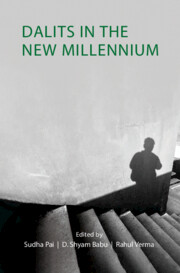Book contents
- Frontmatter
- Contents
- List of Figures
- List of Tables
- Acknowledgements
- 1 Introduction: Dalit Discourse in the New Millennium
- Part I Shifting Patterns of Electoral Politics
- Part II Popular Culture, Discourse, and Protest
- Part III Transformations in Ideology and Identity
- Part IV Aspirations and Anxieties
- 16 Technology in the Lives of Young Dalits
- 17 Dalit Middle Class: Aspirations, Networks, and Social Capital
- 18 The Persisting Developmental Gap: A Case for Restitution and Reparations
- 19 Dalit Capitalism: Adversity, Opportunity, and Agency
- Part V Discrimination and Representation
- About the Contributors
- Index
18 - The Persisting Developmental Gap: A Case for Restitution and Reparations
from Part IV - Aspirations and Anxieties
Published online by Cambridge University Press: 12 July 2023
- Frontmatter
- Contents
- List of Figures
- List of Tables
- Acknowledgements
- 1 Introduction: Dalit Discourse in the New Millennium
- Part I Shifting Patterns of Electoral Politics
- Part II Popular Culture, Discourse, and Protest
- Part III Transformations in Ideology and Identity
- Part IV Aspirations and Anxieties
- 16 Technology in the Lives of Young Dalits
- 17 Dalit Middle Class: Aspirations, Networks, and Social Capital
- 18 The Persisting Developmental Gap: A Case for Restitution and Reparations
- 19 Dalit Capitalism: Adversity, Opportunity, and Agency
- Part V Discrimination and Representation
- About the Contributors
- Index
Summary
How long should it take Dalits, the ‘ex-untouchables’ of India, to overcome their historical (and continuing) disadvantage and be able to flourish at the same standards of living as those of the so-called general castes, or, if not match, come close to them in terms of the many indicators of development and well-being? This is an often debated and contested question, which seems to have emerged yet again in contemporary political, legal, and popular debates, with arguments put forth on both sides of the spectrum.
On the one hand, it is contested that 73 years of constitutional provisions, such as the law against the Hindu (but not restricted to Hinduism) practice of untouchability and for protection from caste atrocities, as well as reservations in educational institutions, public-sector jobs, and the legislature, are policy tools which have been instituted for long enough to help Dalits rise from their deplorable condition to a status of respect, socio-economic well-being, and upward mobility. These arguments claim that these laws are no longer required and that the practices of untouchability, discrimination, and exclusion are vestiges of ancient and medieval history, because India is now progressing on the path of creating a casteless social order.
On the other hand, contrary to the aforementioned arguments, evidence shows that while the Dalits of India have indeed come a long way from their untouchable and enslaved status as a community, the developmental gap between them and the so-called general category (excluding the tribal and the Other Backward Class [OBC] population) is glaring and persistent. Whichever indicator of human development we examine – economic, social, cultural, health, and so on – it is easy to see that Dalits lag far behind the rest. In this chapter, we will examine how this gap has evolved over time. The continuation of caste atrocities is another grave matter that would require an independent study and, while important, will not be a focus of this chapter.
The chapter will closely look at the persisting gap in as many different aspects of life as available data would let us, and we will try to understand how much of it emerges from down-the-stream outcomes of the historical practice of enslavement and the denial of human and civil rights.
- Type
- Chapter
- Information
- Dalits in the New Millennium , pp. 316 - 339Publisher: Cambridge University PressPrint publication year: 2023



